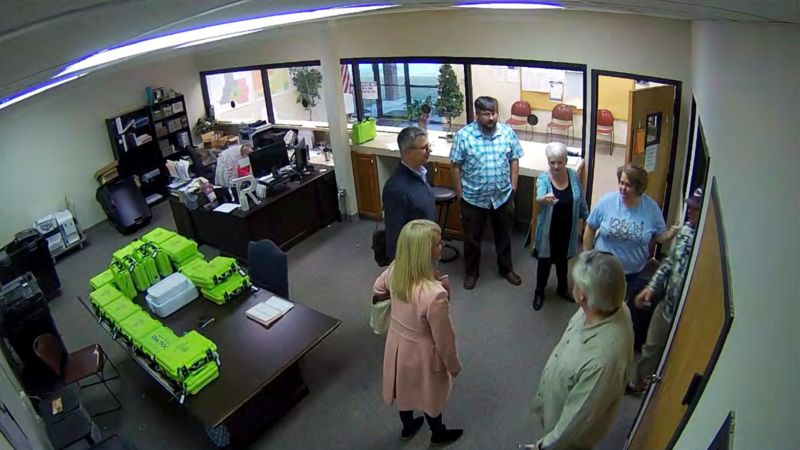The breach of the Coffee County elections office can seem almost out of place in the 97-page Georgia indictment of former President Donald Trump and associates.
The sprawling racketeering allegations spread from centers of power with pressure on the vice president to ignore the Constitution, reported calls to secretaries of state to change vote counts, and the creation of slates of fake electors for Congress. They also include the invitation of a tech team to a non-public area of a small-town administration building.
But to some people in Coffee County, deep in southern Georgia and far from interstates, the alleged crimes were merely the latest chapter in a local history of failing to secure the rights and votes of residents. And they worry it’s a history that will repeat.
Among the 19 mugshots that flowed from the charges brought 200 miles north in Atlanta were faces that were familiar in Douglas, the seat of Coffee County.
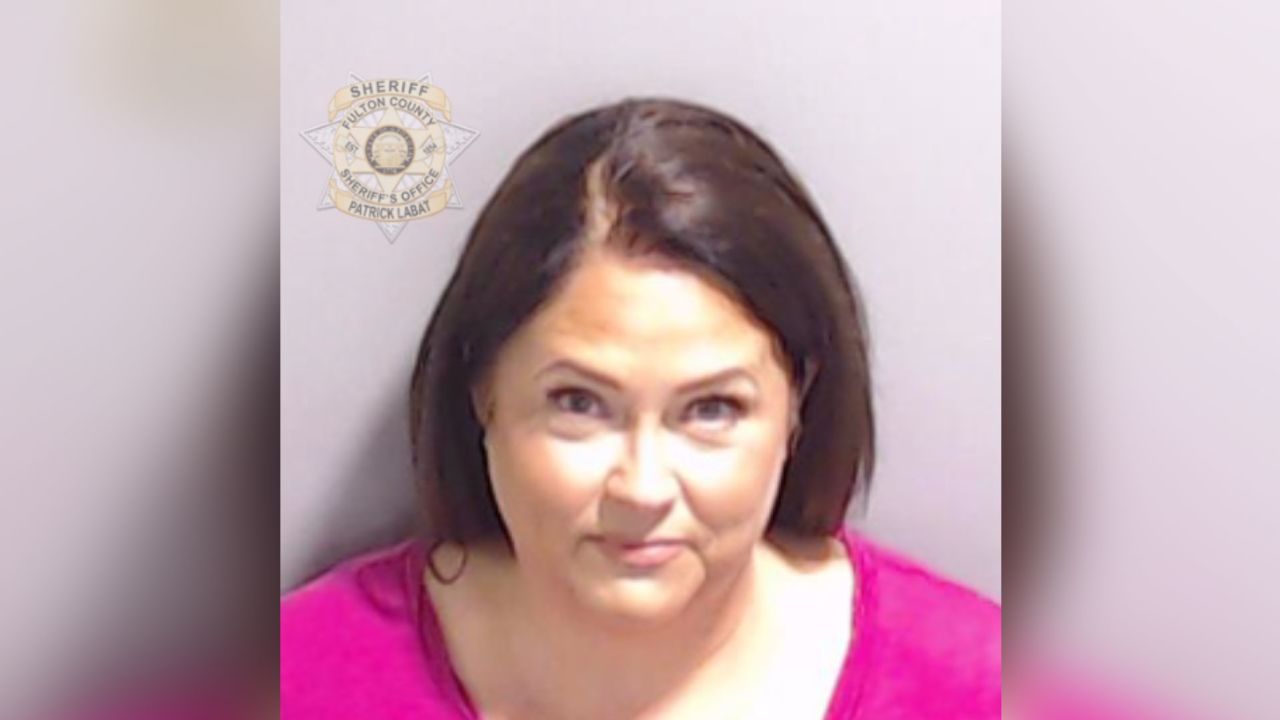
Prosecutors allege that former county Republican Party chair Cathy Latham and former elections supervisor Misty Hampton helped to facilitate employees from a firm hired by Trump attorneys to access and copy sensitive voter data and election software. Surveillance video captured Latham waving the visitors inside, and Hampton in the office as they allegedly accessed the data. Both have pleaded not guilty.
Mike Clark, owner of some small businesses in Douglas, said he was struck by the way the surveillance footage showed the election officials entering the building in broad daylight. “You walk inside the voter registration office with no mask on, and they just give you the votes. They just give them to you! Why? Why would that be?” Clark said. “That shows you right there it ain’t just started. It’s always been just like that.”
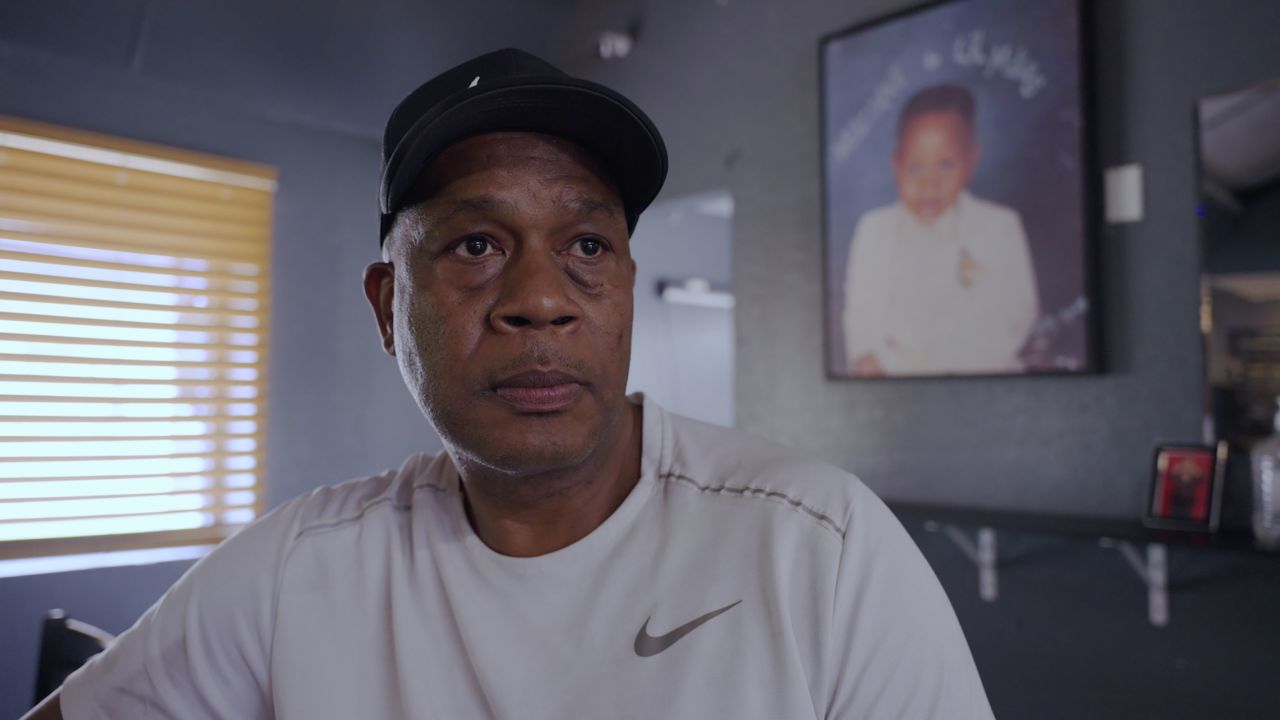
Douglas City Commissioner Kentaiwon Durham agreed. “That’s what power and privilege do. It makes you feel as if you can do anything you want to do,” he said. “They thought they were above the law and above the Constitution.” Durham, who like Clark is Black, thought it would be “a whole different ballgame” if it were his face in the surveillance footage.
Douglas is a majority Black city, and the surrounding Coffee County is about 68% White and 29% Black. Like many places in the South, Black citizens have had to fight for democratic rights in court – repeatedly suing for representative districts for the election of local officials since the 1970s. In the late summer, it’s unbearably hot – so hot that if you sit outside too long people ask if you’re crazy. If you have a latent southern accent, the town will draw it out.
When CNN asked local people how to put the alleged election office breach in the broader context of voting rights in the county, nearly everyone suggested we speak to “Miss Livvy.” Olivia Coley-Pearson is a Douglas city commissioner, the first Black woman elected to the position. She’s a tall woman who wore a Barbie-pink blazer when we met, and like many others CNN spoke with in Coffee County, she saw the involvement of her county in the alleged Trump scheme as part of a long local pattern of voter suppression and intimidation.
“There’s power – a certain amount of power and control when you’re in certain offices,” Coley-Pearson told CNN. “Some people will do whatever it takes to maintain it. … And if it takes voter intimidation to do it, some people willing to intimidate to maintain that power and control.”
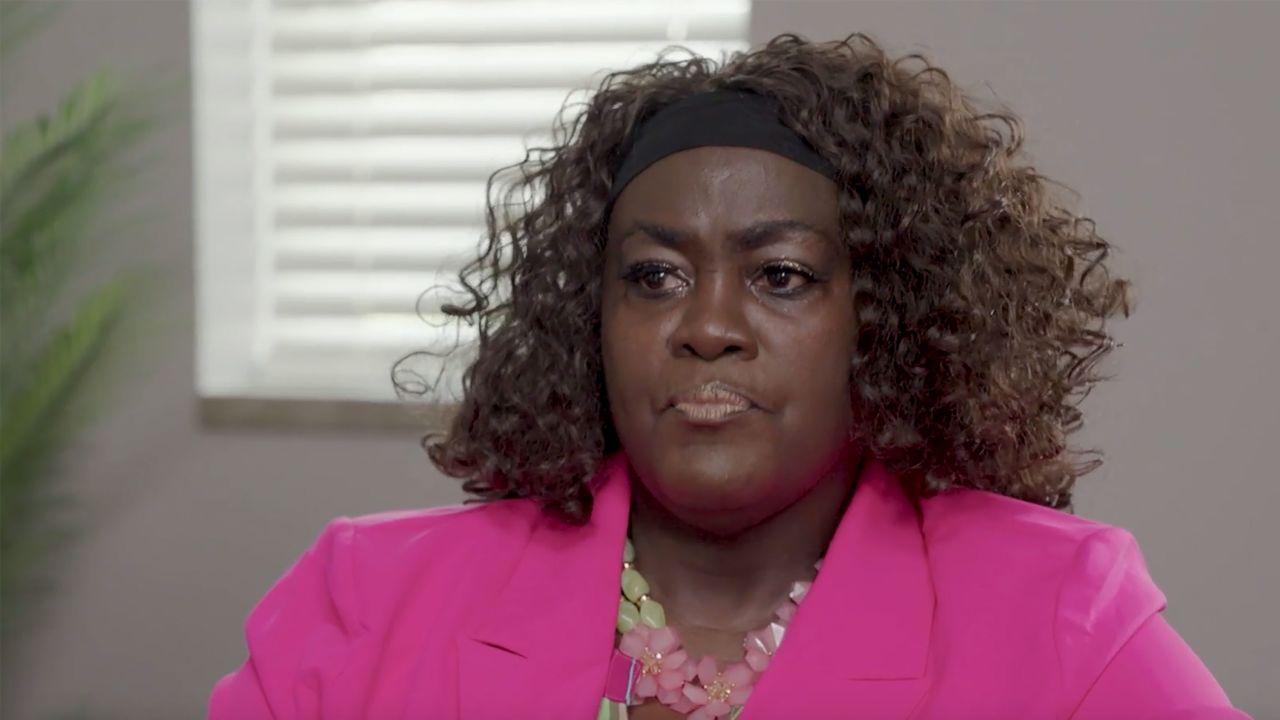
Coley-Pearson, named a “human rights hero” by the American Bar Association, follows in the footsteps of her mother, who was a political activist in Coffee County in the 1970s, the decade after segregationist Gov. Lester Maddox had picked the county to host many of his speeches. Gladys Coley is commemorated with others in a memorial plaque for fighting for civil rights in Douglas and across the county.
Coley-Pearson is well-known for helping people who may need a ride to the polls. Not everyone around town appreciates her efforts, however. In a Facebook Live video posted a couple days before the alleged breach, Latham complained about Coley-Pearson’s get-out-the-vote efforts for Georgia’s runoff elections to the US Senate.
“Olivia Pearson’s up to her normal – handing out hamburgers and hot dogs … to people who voted and stuff,” Latham said, running her fingers through her cropped blonde hair in apparent exasperation. “So, all kinds of things happening in Coffee County just to get people to come vote. Yeah, it’s not a really good situation down here.”
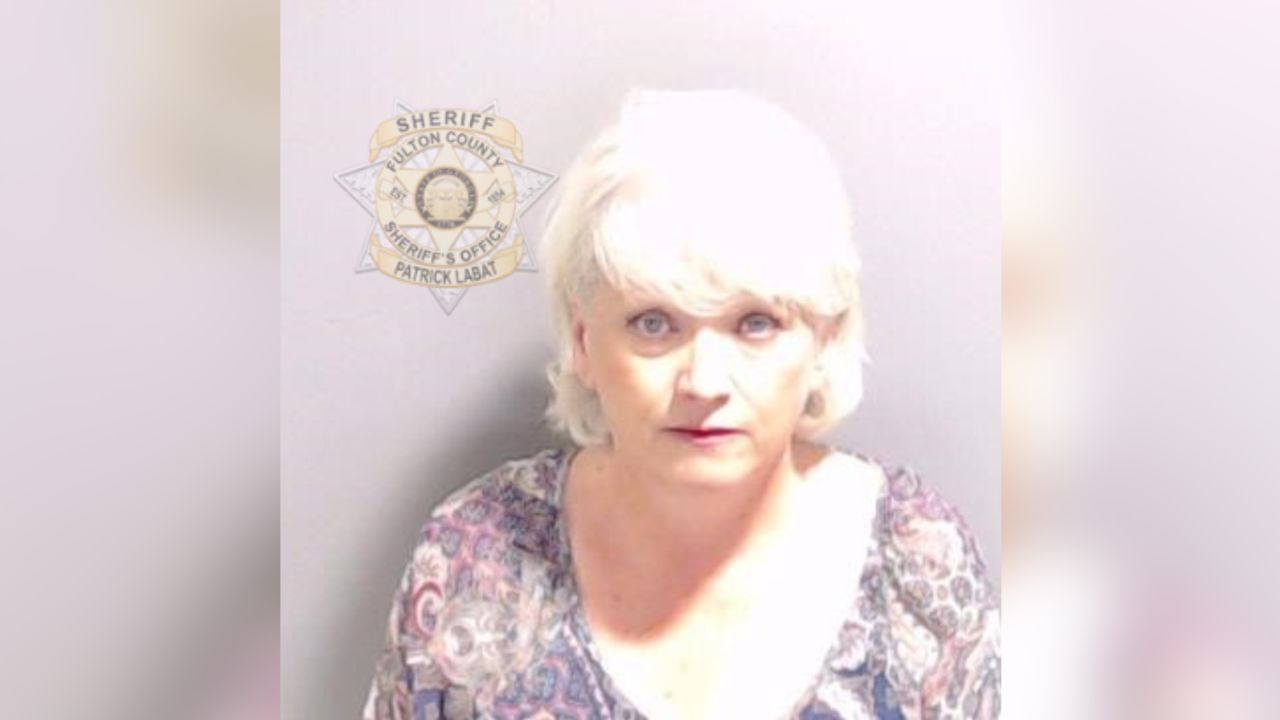
Latham urged her viewers to vote. “We got to out-vote the fraud,” she said. She has not responded to CNN’s request for comment.
Coley-Pearson had tangled with local officials over voter access several times. Georgia law allows people who are disabled or illiterate to get assistance in voting, and Coley-Pearson helped with that in the 2012 election. At the time, it seemed uneventful.
But Coffee County officials complained to the Georgia secretary of state’s office that she helped people who didn’t qualify for assistance. It led to a years-long investigation, and though the state didn’t prosecute her, she was charged locally with two felonies. After one trial ended in a hung jury, she was found not guilty in the second in 2018.
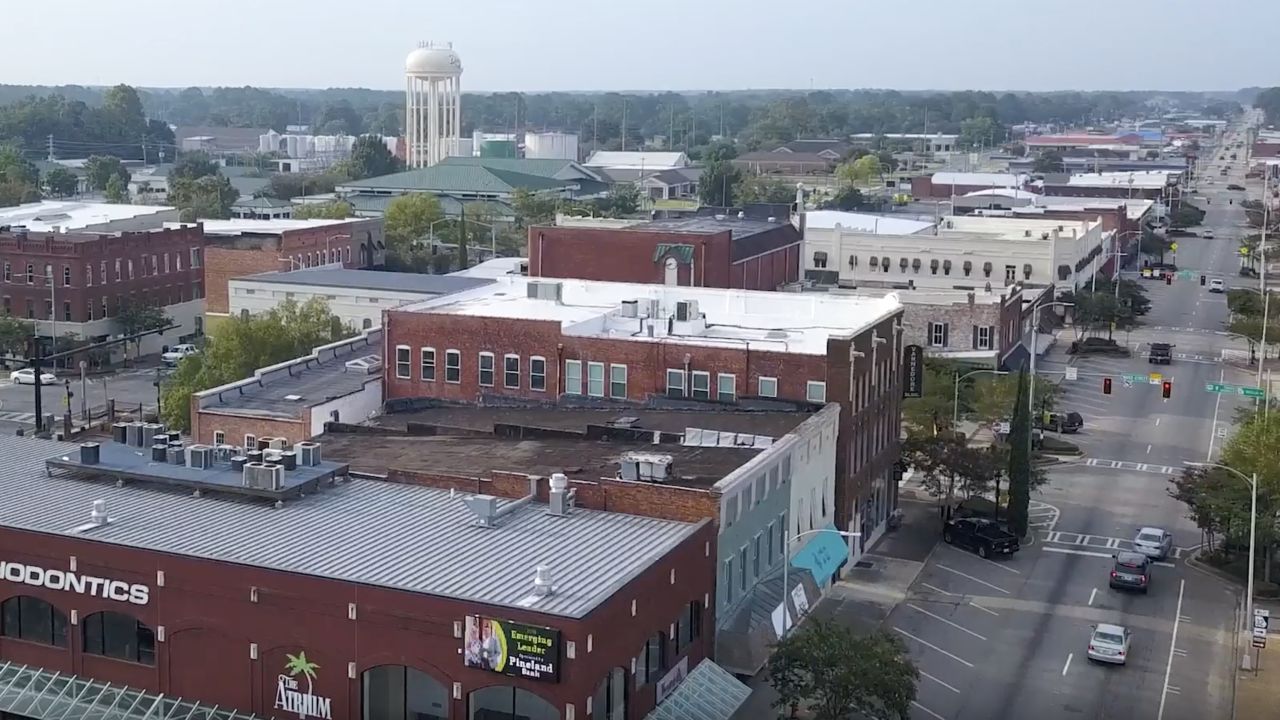
Then, during early voting in October 2020, Coley-Pearson asked a question about the buttons on a voting machine, sparking a confrontation with then-election supervisor Misty Hampton. Coley-Pearson says Hampton was “hollering” that she must not touch the machine. Hampton, who is White, has said in a deposition that she spoke in a “normal voice” and told Coley-Pearson she was being “disruptive.” The voter Coley-Pearson assisted said in a deposition she felt afraid of Hampton.
Coley-Pearson left the polling place to pick up another voter, Rolanda Williams. In the meantime, Hampton called the police. “She’s out here touching my darn machines,” Hampton told the police, as recorded in a police video. At one point, after saying Coley-Pearson had improperly touched the ballot, Hampton said, “I don’t care what I got to file, what I got to do, she is not to come back to my office. If I have to say I feel threatened I don’t care. Because I do!” Hampton has not responded to CNN’s request for comment.
When Coley-Pearson returned to the polling place with Williams and stepped out of the car, she was met by police officers. They said she was banned from the property for yelling, she remembers. “I guess they didn’t like me asking why, and I got arrested. I was put in handcuffs,” Coley-Pearson said, beginning to cry at the memory.
“She was telling the cop that the handcuffs were too tight. And to me, he was trying to get them tighter,” Williams, the voter Coley-Pearson was driving, told CNN. When Williams went inside the polling place, she said Hampton began asking her questions. “She was asking me where I work – which, I felt was none of her business. … She actually pulled up a Facebook page of mine. And I felt like I was into some type of trouble or something.”
“I was scared and fearful,” Williams said. “I didn’t want to go back up there to vote. And I won’t go back and vote, because of everything that’s going on. I didn’t understand why they call this ‘Crooked Coffee.’ But now I understand.”
Coley-Pearson is now suing the city and election officials over her treatment. The city says it did not violate her constitutional rights.
Disappointment and fear
Many locals said the town was divided, though not neatly along racial lines. Jim Hudson, a White man with white hair and a neatly tucked-in button-down shirt, has been pushing local officials to appoint an independent counsel to investigate what happened around the apparent breach and advise how to make sure it never happens again.
A retired lawyer, Hudson said he was “shocked … and very disappointed, and hurt” when he started researching what happened. His investigation had gone deep, reading transcripts of depositions in a related court case and analyzing the surveillance video from the election office. “I still feel that way, because of the failure of the commissioners as well as the board of elections to take action.”
Hudson was distressed by the sense he hadn’t known the county as well as he’d thought. “It’s my home,” he said. “I’ve been here many years. I’m going to die here. And I want a place that we can all be proud of.”
Hampton resigned in February 2021 as election supervisor over falsifying timesheets.
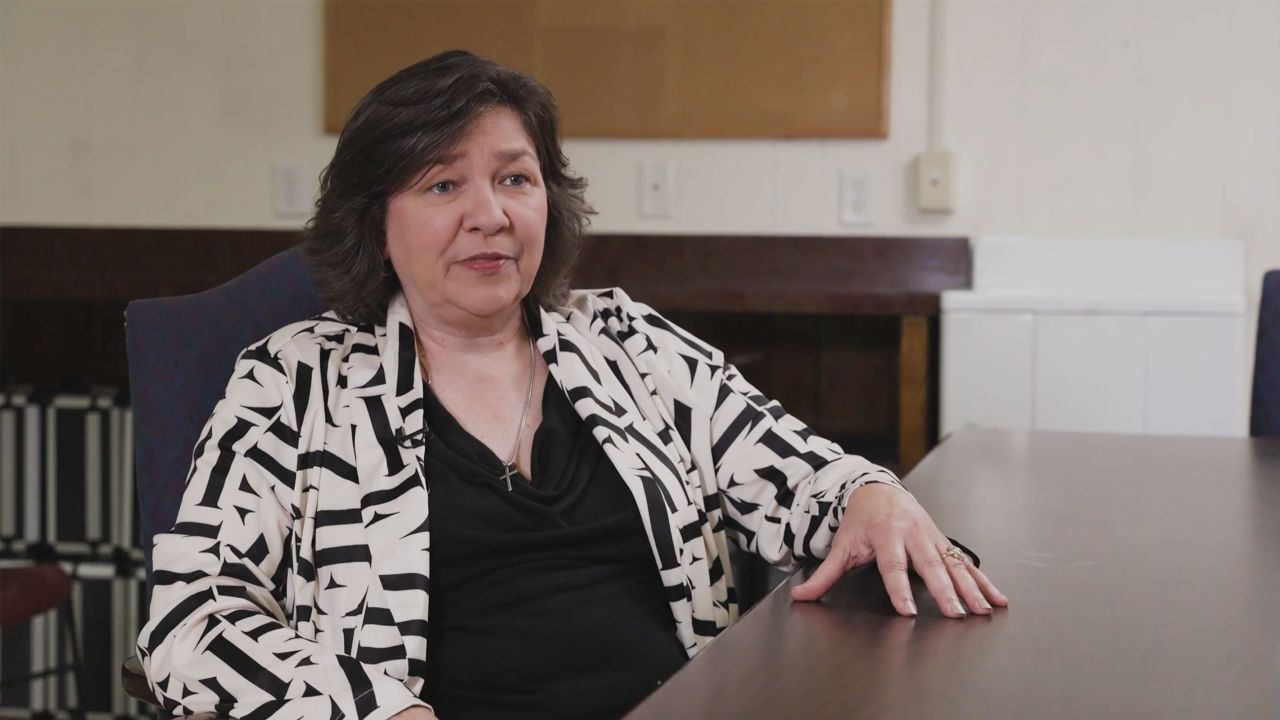
Christy Nipper, the new election supervisor, said, referring to the breach, “There’s not a lot of people anywhere in the county that I’m aware of that have spoken a lot about it.” She said she felt a responsibility to do so. “Obviously, I feel like the public needs reassurance, and it’s going to be hard to move past this if we don’t give them that. I feel like they deserve it,” Nipper said. She said she tried to do so when citizens came into her office asking if their votes would be counted. The breach had not changed the vote totals, she said, and she would not let anyone into the secure election data area.
CNN often encounters people who have smart things to say but are scared to speak publicly, fearing a social media pile-on from strangers. But in Douglas, people feared backlash from people they know in town. Mickeayla Clark, head of the Coffee County Democrats, said some were afraid they’d risk their livelihoods if they spoke out.
A woman at a bar asked CNN to follow her outside for a smoke. She said she was afraid she wouldn’t be welcome back if she talked, but she did anyway. She said she was for Trump all the way – she voted for him in 2020 and would do it again – but, speaking of the alleged breach, she said, “That election sh*t wasn’t right. They shouldn’t have done that.”
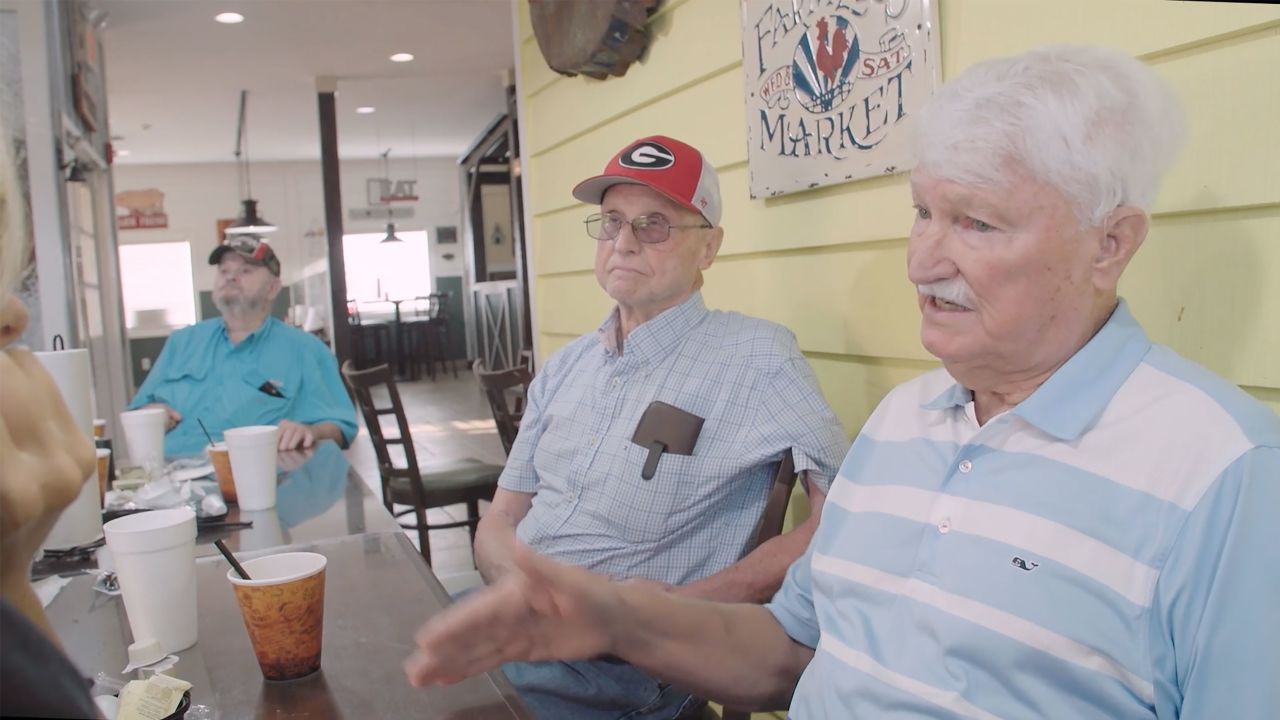
The bar crowd tipped CNN off to a group of older White men known for holding court over breakfast every morning at the restaurant Hog-N-Bones. After debating with CNN the meaning of the Sermon on the Mount, Zip Grantham and Tommy Crozier agreed to an interview. They said they didn’t think there was racial discrimination in the county anymore – Black people, they said, could serve in the military and learn at the same schools. The men said they’d vote for Trump in the 2024 election if he was the Republican nominee, but maybe not in the primary.
“Do I like Trump? I wouldn’t want him sitting at the table with me this morning talking,” Grantham said. “But yeah, I think he had good values.”
Still, he said of the former president, “maybe he should be held responsible.”
And with the spotlight on Coffee County, city commissioner Durham said he welcomed a reckoning.
Of Latham, Hampton and the others indicted, he quoted his grandma: “You make the bed up, you gotta lay in it.”

